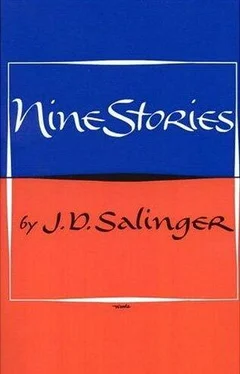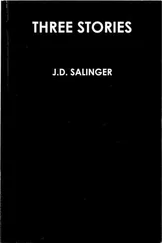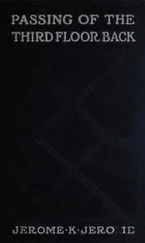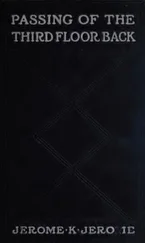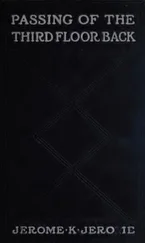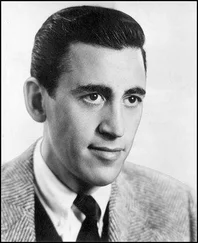Jerome Salinger - Nine Stories
Здесь есть возможность читать онлайн «Jerome Salinger - Nine Stories» весь текст электронной книги совершенно бесплатно (целиком полную версию без сокращений). В некоторых случаях можно слушать аудио, скачать через торрент в формате fb2 и присутствует краткое содержание. Год выпуска: 1953, Издательство: Little Brown, Жанр: Классическая проза, на английском языке. Описание произведения, (предисловие) а так же отзывы посетителей доступны на портале библиотеки ЛибКат.
- Название:Nine Stories
- Автор:
- Издательство:Little Brown
- Жанр:
- Год:1953
- ISBN:нет данных
- Рейтинг книги:4 / 5. Голосов: 2
-
Избранное:Добавить в избранное
- Отзывы:
-
Ваша оценка:
- 80
- 1
- 2
- 3
- 4
- 5
Nine Stories: краткое содержание, описание и аннотация
Предлагаем к чтению аннотацию, описание, краткое содержание или предисловие (зависит от того, что написал сам автор книги «Nine Stories»). Если вы не нашли необходимую информацию о книге — напишите в комментариях, мы постараемся отыскать её.
Nine Stories — читать онлайн бесплатно полную книгу (весь текст) целиком
Ниже представлен текст книги, разбитый по страницам. Система сохранения места последней прочитанной страницы, позволяет с удобством читать онлайн бесплатно книгу «Nine Stories», без необходимости каждый раз заново искать на чём Вы остановились. Поставьте закладку, и сможете в любой момент перейти на страницу, на которой закончили чтение.
Интервал:
Закладка:
Nicholson snorted mildly. “It might not be a tragedy from your point of view, but it would certainly be a sad event for your mother and dad,” he said “Ever consider that?”
“Yes, of course, I have,” Teddy said. “But that’s only because they have names and emotions for everything that happens.” He had been keeping his hands tucked under his legs again. He took them out now, put his arms up on the armrests, and looked at Nicholson. “You know Sven? The man that takes care of the gym?” he asked. He waited till he got a nod from Nicholson. “Well, if Sven dreamed tonight that his dog died, he’d have a very, very bad night’s sleep, because he’s very fond of that dog. But when he woke up in the morning, everything would be all right. He’d know it was only a dream.”
Nicholson nodded. “What’s the point, exactly?”
“The point is if his dog really died, it would be exactly the same thing. Only, he wouldn’t know it. I mean he wouldn’t wake up till he died himself.” Nicholson, looking detached, was using his right hand to give himself a slow, sensuous massage at the back of the neck. His left hand, motionless on the armrest, with a fresh, unlighted cigarette between the fingers, looked oddly white and inorganic in the brilliant sunlight.
Teddy suddenly got up. “I really have to go now, I’m afraid,” he said. He sat down, tentatively, on the extended leg attachment of his chair, facing Nicholson, and tucked in his T shirt. “I have about one and a half minutes, I guess, to get to my swimming lesson,” he said. “It’s all the way down on E Deck.”
“May I ask why you told Professor Peet he should stop teaching after the first of the year?” Nicholson asked, rather bluntly. “I know Bob Peet. That’s why I ask.”
Teddy tightened his alligator belt. “Only because he’s quite spiritual, and he’s teaching a lot of stuff right now that isn’t very good for him if he wants to make any real spiritual advancement. It stimulates him too much. It’s time for him to take everything out of his head, instead of putting more stuff in. He could get rid of a lot of the apple in just this one life if he wanted to. He’s very good at meditating.” Teddy got up. “I better go now. I don’t want to be too late.”
Nicholson looked up at him, and sustained the look—detaining him. “What would you do if you could change the educational system?” he asked ambiguously. “Ever think about that at all?”
“I really have to go,” Teddy said.
“Just answer that one question,” Nicholson said. “Education’s my baby, actually—that’s what I teach. That’s why I ask.”
“Well … I’m not too sure what I’d do,” Teddy said. “I know I’m pretty sure I wouldn’t start with the things schools usually start with.” He folded his arms, and reflected briefly. “I think I’d first just assemble all the children together and show them how to meditate. I’d try to show them how to find out who they are, not just what their names are and things like that … I guess, even before that, I’d get them to empty out everything their parents and everybody ever told them. I mean even if their parents just told them an elephant’s big, I’d make them empty that out. An elephant’s only big when it’s next to something else—a dog or a lady, for example.” Teddy thought another moment. “I wouldn’t even tell them an elephant has a trunk. I might show them an elephant, if I had one handy, but I’d let them just walk up to the elephant not knowing anything more about it than the elephant knew about them. The same thing with grass, and other things. I wouldn’t even tell them grass is green. Colors are only names. I mean if you tell them the grass is green, it makes them start expecting the grass to look a certain way—your way—instead of some other way that may be just as good, and may be much better … I don’t know. I’d just make them vomit up every bit of the apple their parents and everybody made them take a bite out of.”
“There’s no risk you’d be raising a little generation of ignoramuses?”
“Why? They wouldn’t any more be ignoramuses than an elephant is. Or a bird is. Or a tree is,” Teddy said. “Just because something is a certain way, instead of just behaves a certain way, doesn’t mean it’s an ignoramus.”
“No?”
“No!” Teddy said. “Besides, if they wanted to learn all that other stuff—names and colors and things—they could do it, if they felt like it, later on when they were older. But I’d want them to begin with all the real ways of looking at things, not just the way all the other apple-eaters look at things—that’s what I mean.” He came closer to Nicholson, and extended his hand down to him. “I have to go now. Honestly. I’ve enjoyed—”
“Just one second—sit down a minute,” Nicholson said. “Ever think you might like to do something in research when you grow up? Medical research, or something of that kind? It seems to me, with your mind, you might eventually—”
Teddy answered, but without sitting down. “I thought about that once, a couple of years ago,” he said. “I’ve talked to quite a few doctors.” He shook his head. “That wouldn’t interest me very much. Doctors stay too right on the surface. They’re always talking about cells and things.”
“Oh? You don’t attach any importance to cell structure?”
“Yes, sure, I do. But doctors talk about cells as if they had such unlimited importance all by themselves. As if they didn’t really belong to the person that has them.” Teddy brushed back his hair from his forehead with one hand. “I grew my own body,” he said. “Nobody else did it for me. So if I grew it, I must have known how to grow it. Unconsciously, at least. I may have lost the conscious knowledge of how to grow it sometime in the last few hundred thousand years, but the knowledge is still there, because—obviously—I’ve used it… . It would take quite a lot of meditation and emptying out to get the whole thing back—I mean the conscious knowledge—but you could do it if you wanted to. If you opened up wide enough.” He suddenly reached down and picked up Nicholson’s right hand from the armrest. He shook it just once, cordially, and said, “Goodbye. I have to go.” And this time, Nicholson wasn’t able to detain him, he started so quickly to make his way through the aisle.
Nicholson sat motionless for some few minutes after he left, his hands on the armrests of the chair, his unlighted cigarette still between the fingers of his left hand. Finally, he raised his right hand and used it as if to check whether his collar was still open. Then he lit his cigarette, and sat quite still again.
He smoked the cigarette down to its end, then abruptly let one foot over the side of the chair, stepped on the cigarette, got to his feet, and made his way, rather quickly, out of the aisle.
Using the forwardship stairway, he descended fairly briskly to the Promenade Deck. Without stopping there, he continued on down, still quite rapidly, to Main Deck. Then to A Deck. Then to B Deck. Then to C Deck. Then to D Deck.
At D Deck the forwardship stairway ended, and Nicholson stood for a moment, apparently at some loss for direction. However, he spotted someone who looked able to guide him. Halfway down the passageway, a stewardess was sitting on a chair outside a galleyway, reading a magazine and smoking a cigarette. Nicholson went down to her, consulted her briefly, thanked her, then took a few additional steps forwardship and opened a heavy metal door that read: TO THE POOL. It opened onto a narrow, uncarpeted staircase.
He was little more than halfway down the staircase when he heard an all-piercing, sustained scream—clearly coming from a small, female child. It was highly acoustical, as though it were reverberating within four tiled walls.
Интервал:
Закладка:
Похожие книги на «Nine Stories»
Представляем Вашему вниманию похожие книги на «Nine Stories» списком для выбора. Мы отобрали схожую по названию и смыслу литературу в надежде предоставить читателям больше вариантов отыскать новые, интересные, ещё непрочитанные произведения.
Обсуждение, отзывы о книге «Nine Stories» и просто собственные мнения читателей. Оставьте ваши комментарии, напишите, что Вы думаете о произведении, его смысле или главных героях. Укажите что конкретно понравилось, а что нет, и почему Вы так считаете.
